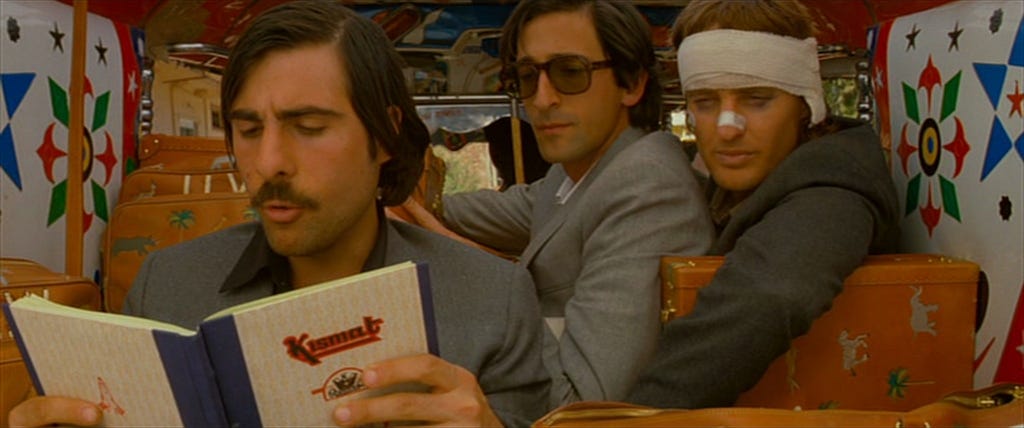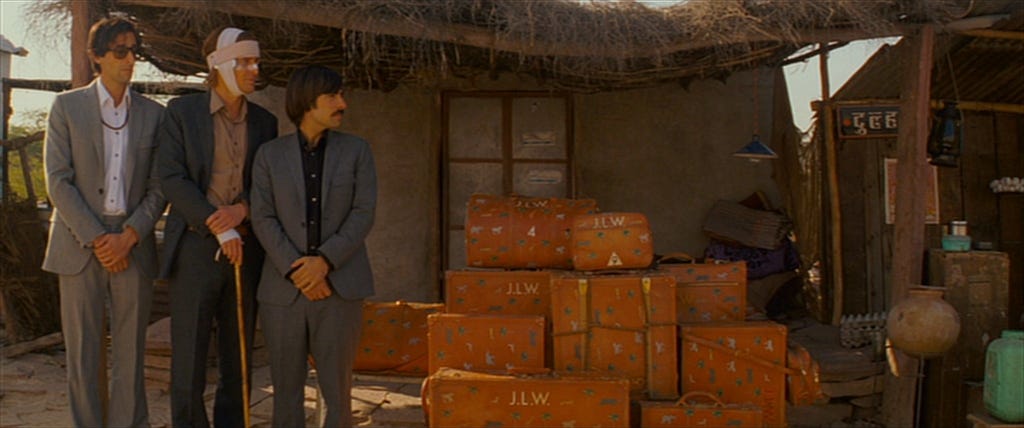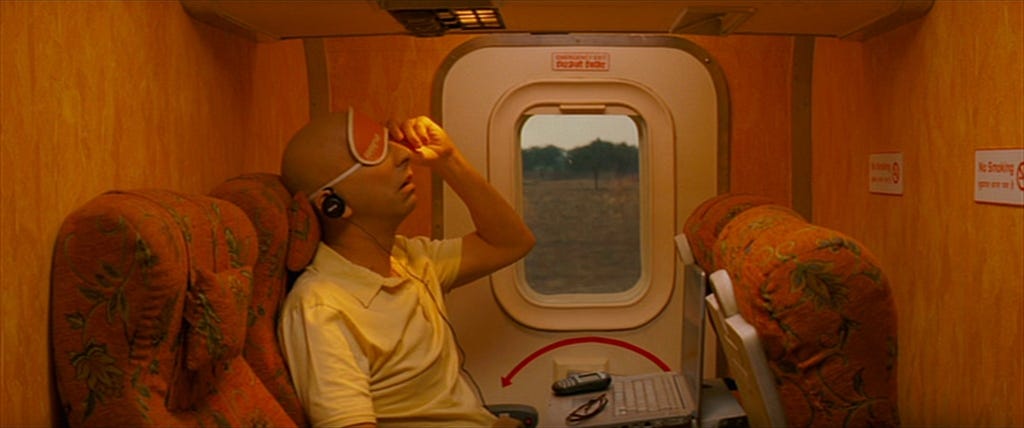Review: "The Darjeeling Limited" is Wes Anderson at his most uniquely emotive
Movie of the Week #37
Welcome to Movie of the Week, a Wednesday column where we take a look back at a classic, obscure, or otherwise interesting movie, with writing of mine that’s never been published online before. Enjoy…
The Darjeeling Limited
2007, Dir. Wes Anderson
Originally published in the book 200 Reviews, based on writing from 2008, 2013, and 2023.
I reside on something of an island in my intense love for The Darjeeling Limited, but I am quite happy to be there, for I fell in love with this movie when first I saw it, and find my passion reignited and reinvented every time I revisit it. The film’s detractors will cite its quirky, affected nature as cause for complaint – this is a touch more offbeat than anything else in Wes Anderson’s singular filmography up to now – but those critics miss the point. As with all of Anderson’s films, The Darjeeling Limited is an exploration of family, and here, he asks a question that can only bring an inscrutable answer: Is it blood that binds family together, or something more?
At a critical junction in the story, Jack (Jason Schwartzman), one of the three central brothers, wonders “if the three of us would've been friends in real life. Not as brothers, but as people.” These characters bicker, and squabble, and display constant resentment, but though each could leave the titular train at any given moment, they choose to stay, and understand each other and themselves – if not the bonds that bind them – better along the way.
Anderson cannot offer any clear explanation for what it is that makes brotherhood a powerful unit, but he can assert that it will always be something worth cherishing and holding onto, a dense and inscrutable conclusion perfectly befitting an atypical tone and style. The only way to tell this story honestly, and to explore the central question with any depth or meaning, is to present the oddities of brotherly bonds, focusing on chemistry over narrative cohesion. The path we walk in loving our family is never a straight line, and by entering such jagged territory, Anderson achieves greater emotional, if not literal, clarity.
Anderson’s smart script (which he co-wrote with Roman Coppola and Jason Shwartzman) is excellent. The dialogue is just a joy to listen to. Each line has multiple purposes, whether it be humor, philosophy, or simply bringing out multiple sides of the character. This is my favorite kind of comedy, never going for the obvious gag, with humor that is extremely subtle; and it is also my favorite kind of drama; there is plenty of emotion, but never spoon-fed to you. The film is quirky, strange, hilarious, heart-breaking, awkward, and most importantly, heart-warming; everything a film should be. The movie is only 90 minutes, but it feels so much longer, not because it is slow or badly paced, but because we get inside the heads of these characters, and feel the same journey that they go through. As an audience member, I felt like I was whisked away to India on my own spiritual journey, and came back home all in 90 minutes. I love this movie. To me, it was absolutely the best of 2007.
This is all to say why The Darjeeling Limited works so powerfully for me, even before I mention the performances, or the cinematography – full of ‘cutting in camera’ where Anderson moves the image to new framing rather than using edits, and making such bold, inventive use of every inch of the wide 2.35:1 aspect ratio – or the exquisite use of music – especially the classic tracks from Indian cinema, placed in the soundscape like they are coming from an old tinny radio, like one is in the room with the characters listening – or what a masterwork Anderson, Schwartzman, and Natalie Portman crafted in the accompanying short, Hotel Chevaliar.Depicting the short story Schwartzman’s character reads to his brothers late in the film, nothing of particular importance happens in this short; like the feature film, it’s all about character development, as we get to know these two people and glean hints about their past with surprising depth in just 12 minutes. On its own, it is quite good, but taken with The Darjeeling Limited – Anderson calls it ‘Part 1’ of the experience – it adds a huge depth to both films.
What might be my favorite piece of filmmaking in Wes Anderson’s canon comes late in The Darjeeling Limited: as the three brothers and their long-lost mother meditate, and The Rolling Stones’ “Play with Fire” comes up on the soundtrack, we get a series of whip-pans and tracking shots moving from car to car on a mythical, impossible train connecting hotel rooms, airplane cabins, and homes in India and back in America, where major, minor, and previously unseen characters from across the film are all simultaneously sitting still and moving forward, the train that is life ushering them forever forward, all invariably connected. “Maybe we could express ourselves more fully if we say it without words,” Anjelica Huston as the mother says at the outset of the sequence. As beautiful and singular as Anderson’s dialogue is, here he does just that, and offers something of a visual thesis statement to his entire body work, past, present, and future.
Read the book 200 Reviews by Jonathan R. Lack in Paperback or on Kindle
Subscribe to PURELY ACADEMIC, our monthly variety podcast about movies, video games, TV, and more
Like anime? Listen to the podcast I host with Sean Chapman, JAPANIMATION STATION, where we review all sorts of anime every week. Watch on YouTube or Subscribe wherever you get your podcasts.






Royal Tenanbaums for me, darjeeling a close second with life aquatic.
Fantastic film, so much detail. Do you have a favourite of his?